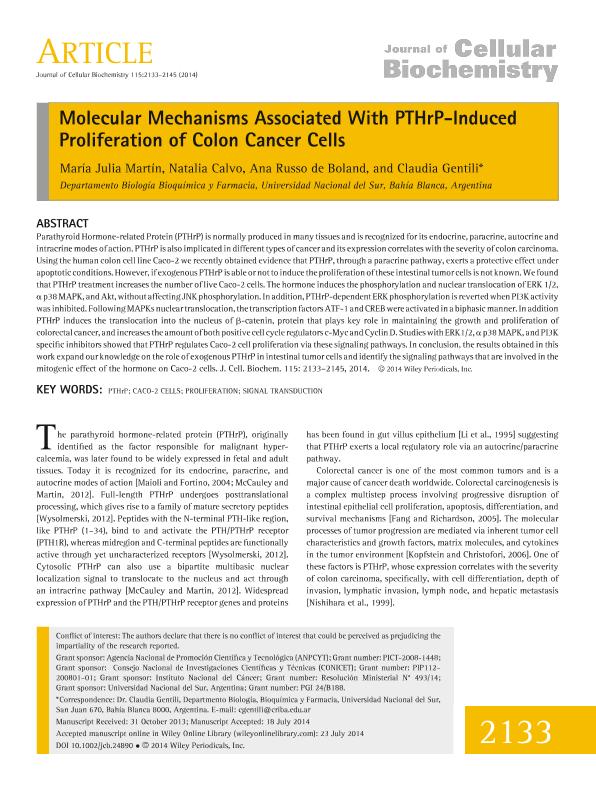Artículo
Molecular Mechanisms Associated With PTHrP-Induced Proliferation of Colon Cancer Cells
Fecha de publicación:
12/2014
Editorial:
Wiley
Revista:
Journal of Cellular Biochemistry
ISSN:
0730-2312
Idioma:
Inglés
Tipo de recurso:
Artículo publicado
Clasificación temática:
Resumen
Parathyroid Hormone-related Protein (PTHrP) is normally produced in many tissues and is recognized for its endocrine, paracrine, autocrine and intracrine modes of action. PTHrP is also implicated in different types of cancer and its expression correlates with the severity of colon carcinoma. Using the human colon cell line Caco-2 we recently obtained evidence that PTHrP, through a paracrine pathway, exerts a protective effect under apoptotic conditions. However, if exogenous PTHrP is able or not to induce the proliferation of these intestinal tumor cells is not known. We found that PTHrP treatment increases the number of live Caco-2 cells. The hormone induces the phosphorylation and nuclear translocation of ERK 1/2, α p38 MAPK, and Akt, without affecting JNK phosphorylation. In addition, PTHrP-dependent ERK phosphorylation is reverted when PI3K activity was inhibited. Following MAPKs nuclear translocation, the transcription factors ATF-1 and CREB were activated in a biphasic manner. In addition PTHrP induces the translocation into the nucleus of β-catenin, protein that plays key role in maintaining the growth and proliferation of colorectal cancer, and increases the amount of both positive cell cycle regulators c-Myc and Cyclin D. Studies with ERK1/2, α p38 MAPK, and PI3K specific inhibitors showed that PTHrP regulates Caco-2 cell proliferation via these signaling pathways. In conclusion, the results obtained in this work expand our knowledge on the role of exogenous PTHrP in intestinal tumor cells and identify the signaling pathways that are involved in the mitogenic effect of the hormone on Caco-2 cells
Palabras clave:
Pthrp
,
Caco-2 Cells
,
Proliferation
,
Signal Transduction
Archivos asociados
Licencia
Identificadores
Colecciones
Articulos(CCT - BAHIA BLANCA)
Articulos de CTRO.CIENTIFICO TECNOL.CONICET - BAHIA BLANCA
Articulos de CTRO.CIENTIFICO TECNOL.CONICET - BAHIA BLANCA
Articulos(INBIOSUR)
Articulos de INSTITUTO DE CIENCIAS BIOLOGICAS Y BIOMEDICAS DEL SUR
Articulos de INSTITUTO DE CIENCIAS BIOLOGICAS Y BIOMEDICAS DEL SUR
Citación
Martín, María Julia; Calvo, Natalia Graciela; Russo, Ana Josefa; Gentili, Claudia Rosana; Molecular Mechanisms Associated With PTHrP-Induced Proliferation of Colon Cancer Cells; Wiley; Journal of Cellular Biochemistry; 115; 12; 12-2014; 2133-2145
Compartir
Altmétricas




